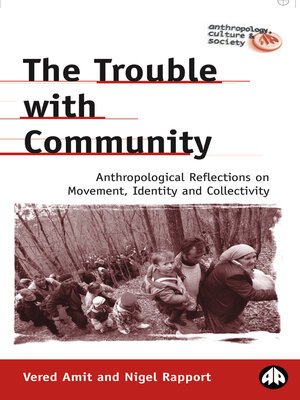The Trouble with Community
ebook ∣ Anthropological Reflections on Movement, Identity and Collectivity · Anthropology, Culture and Society
By Vered Amit

Sign up to save your library
With an OverDrive account, you can save your favorite libraries for at-a-glance information about availability. Find out more about OverDrive accounts.
Find this title in Libby, the library reading app by OverDrive.



Search for a digital library with this title
Title found at these libraries:
| Library Name | Distance |
|---|---|
| Loading... |
'Community' is one of social science's longest-standing concepts. The assumption of much social science has been that humans belong in communities, as social and cultural beings.
The trouble with 'community' is that this is not necessarily so; the personal social networks of individuals' actual experience crosscut collective categories, situations and institutions. Communities can prove unviable or imprisoning; the reality of community life and identity can often be very different from the ideology and the ideal.
In this book, the authors draw on their ethnographic experiences to reappraise the concept and the reality of 'community', in the light of globalisation, religious fundamentalism, identity politics, and renascent localisms. How might anthropology better apprehend social identities which are intrinsically plural, transgressive and ironic? What has anthropology to say about the way in which civil society might hope to accommodate the ongoing construction and the rightful expression of such migrant identities?
The trouble with 'community' is that this is not necessarily so; the personal social networks of individuals' actual experience crosscut collective categories, situations and institutions. Communities can prove unviable or imprisoning; the reality of community life and identity can often be very different from the ideology and the ideal.
In this book, the authors draw on their ethnographic experiences to reappraise the concept and the reality of 'community', in the light of globalisation, religious fundamentalism, identity politics, and renascent localisms. How might anthropology better apprehend social identities which are intrinsically plural, transgressive and ironic? What has anthropology to say about the way in which civil society might hope to accommodate the ongoing construction and the rightful expression of such migrant identities?







